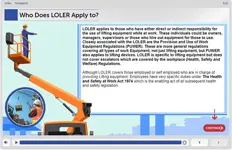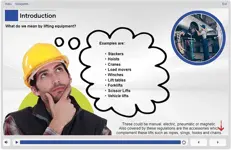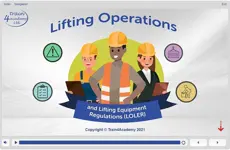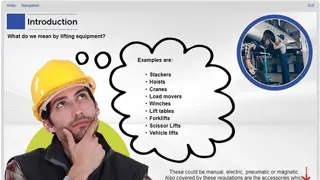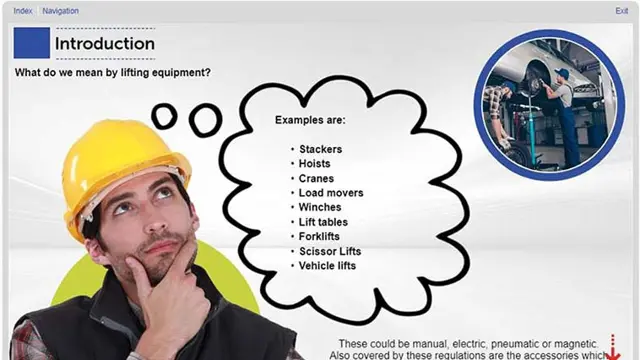
LOLER Training - An Awareness Course
Online Training / Customer Support is Provided / RoSPA Certificate Included
Train4Academy
Summary
- The LOLER Training Course - Free
Add to basket or enquire
Overview
If your job role involves operating or the maintenance of lifting equipment, being familiar with LOLER, the Lifting Operations and Lifting Equipment Regulations is a much-needed course to have completed. Know the types of equipment covered to understand how to minimise the risk of an accident or incidents at the workplace when lifting operations are required.
The online training provides a good level of awareness for both employers and employers as to what LOLER requires of them. The information gained will help those working around lifting equipment operate without getting in harms way.
CPD
Course media
Description
The aim of this course is to provide you with the knowledge of Lifting Operations and Lifting Equipment Regulations. It focuses on why LOLER is important for the health and safety of those involved in operating lifting machinery.
Learning ObjectivesOn completion of this LOLER course, you should be able to:
- List some examples of lifting equipment
- Name the important regulation relating to operating lifting equipment
- Identify some equipment that is NOT covered by LOLER
- Identify who LOLER applies to
- Name some other regulations that also apply to lifting devices
- List some questions you should ask before undertaking lifting operations
- Identify the standards of the equipment needed
- List what the Health and Safety at Work Act requires employees to do
- Name some questions that should be included on a LOLER check sheet
- Identify the importance of LOLER
- Identify what other risks there may be when performing lifting operations
- Identify some types of lifting equipment that is used for lifting people
- List some Dos and Don'ts in regards to LOLER
- Give definitions of hazard and risks
- List the 5 steps to conducting a risk assessment
- Identify what kind of person should carry out a lifting operation
- Identify what suitability's should be obtained before conducting any lifting equipment
- Identify what planning is involved before conducting any lifting operations
- Recognise why risk assessments are of high importance
This course is made up of the following modules:
An Introduction to LOLER
This section introduces the learner to the course and looks at different examples of lifting equipment; it also explains how lifting equipment and accessories which complement lifts are also covered by LOLER.
Module 1 - Considering the Risks
This section of the course concentrates on the different risks that should be considered when operating lifting equipment. It also looks at who LOLER applies to, as well as other risks that may be involved when using lifting equipment and or conducting lifting operations.
Module 2 - Lifting Equipment Standards
This section of the course covers the standards that should be followed, such as equipment suitability, strength and stability. It also looks at the different types of lifting equipment that can be used for lifting operations involving people and why it is important to understand the different risks that are involved.
Module 3 - Risk Assessments and Equipment Inspections
In this final section, you will cover the importance of a 5 step risk assessment and why producing risk assessments are necessary when it comes to lifting operations. It also looks at the importance of regular examination and inspection of equipment and what to do if a fault is discovered.
On completion of the course lessons and training material an online assessment will automatically unlock. The assessment will contain 15 multiple-choice questions and a mark of 75% or above will be required to pass.
The assessment will be marked instantly and so you will know straight away if you have passed or not. If you don't pass first time there's no need to worry. Unlimited resits at absolutely no additional charge are available so you can retake the assessment again as many times as you need to.
Questions and answers
Currently there are no Q&As for this course. Be the first to ask a question.
Certificates
The LOLER Training Course
Digital certificate - Included
Candidates will be receive their certificate via email once they have successfully completed the assessment.
Reviews
Currently there are no reviews for this course. Be the first to leave a review.
Legal information
This course is advertised on reed.co.uk by the Course Provider, whose terms and conditions apply. Purchases are made directly from the Course Provider, and as such, content and materials are supplied by the Course Provider directly. Reed is acting as agent and not reseller in relation to this course. Reed's only responsibility is to facilitate your payment for the course. It is your responsibility to review and agree to the Course Provider's terms and conditions and satisfy yourself as to the suitability of the course you intend to purchase. Reed will not have any responsibility for the content of the course and/or associated materials.
